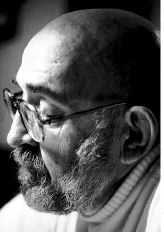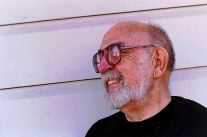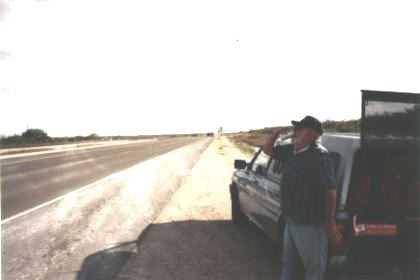[From the October 15, 1995 edition of the Santa Cruz County
Sentinel]
SC Man's Retirement Is Anything But Retiring
by Tracy L. Barnett
Sentinel Staff Writer
Since his retirement in 1982, Bill Burtch of Santa Cruz has seen
more of the world than most people see in a lifetime.
He's taken about 20 trips to Central America, Mexico, and Cuba.
He's come to the aid of the wounded in the war-torn mountains of
Nicaragua. He's defied US laws against travel to Cuba. He's
traveled through war zones in the dead of night.
And he's seen much of it from the driver's seat of a truck.
Burtch, a peace activist who has repeatedly risked his life in his
many voyages to this hemisphere's hot spots, has helped raise
money to buy items ranging from an ambulance to a mobile dental
clinic. He's donated thousands of his own dollars -- not counting
the money and equipment and the seven passports he's lost on the
road -- and he's delivered everything from food and blankets to
baseball equipment.
Burtch returned in September from a month-long sojourn to Chiapas
with the Pastors for Peace caravan. Now he's preparing for his
next trip later this month, in which he'll drive a 350 Econoline
loaded with donated clothing, medical and school supplies to Santa
Cruz's sister city, Jinotepe, Nicaragua.
 Burtch isn't fazed in the least by
his regular rendezvous with danger. It's the confrontations closer
to home that intimidate him.
Burtch isn't fazed in the least by
his regular rendezvous with danger. It's the confrontations closer
to home that intimidate him.
"The only time I feel really insecure is when people challenge me
on this: 'What the hell are you doing supporting these
communists?'
"These are good, solid, middle-class people, and they only know
what they read in the newspapers -- which isn't a whole hell of a
lot."
Logging the Miles
Burtch has logged so many miles that his son Matt jokingly calls
him "Ironbutt."
And the miles have not been easy. He claims that the most life
threatening of his hair-raising treks was not up into the Contra
zone of Nicaragua but through the hairpin turns of the mountain
country of Oaxaca, Mexico, late one night when he found himself in
the middle of a downpour and discovered that the '67 Chevy pickup
he was driving had no wipers.
"That's where I risked my life -- forget about the Contras," he
says with a laugh.
It's that tendency to laugh in the face of danger that has made
Burtch a beloved hero among friends and fellow "caravanistas"
throughout the Americas.
Burtch sometimes wears a T-shirt designed by his son Matt that
sums up his colorful experiences as a charity courier.
A mechanic peers into the engine of an old truck and says, "Here's
your problem, sir. There's a passport stuck in the transmission."
Burtch may have set the world's record for lost passports. And
with the variety of rattletrap vehicles he's delivered to Chiapas,
El Salvador, and Nicaragua, it's a wonder he's always arrived with
no worse than transmission trouble.
One passport was stolen from a pouch under his clothing as he
slept on a Nicaraguan bus. "They could have stolen my pants and I
wouldn't have noticed," he jokes.
The perilous ride in the Chevy pickup was during the historic
Santa Cruz baseball caravan of 1987, when local residents
responded to a call from newspaper columnist Pat Dillon for
baseball equipment for the children of El Cua, Nicaragua.
Moment's Notice
Santa Cruz physician John Isherwood had shown up in El Cua --
where an Oregon man had earlier been killed by the Contras -- and
asked how he could help. The clinic director told him what the
village really needed was toys and baseball equipment for the
children, who were becoming alcoholics by the age of nine.
Isherwood came back and contacted Dillon. The day the column ran,
Isherwood called former Santa Cruz mayor Bert Muhly about
organizing a trip, and Muhly immediately gave Burtch a call.
"You want to go to Nicaragua?" Muhly asked.
"Sure -- when?" Burtch asked.
"Tomorrow," Muhly replied. Sure enough, by the next day there were
three vehicles loaded with baseballs, bats, gloves, dolls and
other toys -- even a life-sized stuffed lion dubbed "Oliver Casey
Poindexter."
Muhly and his wife, Lois, made the trip with Burtch. Lois says she
liked travelling with him because he knew the road so well.
"He's the kind of guy who'll just drop everything to do what he
does down there," says Muhly, who has been a friend of Burtch's
since the mid 80s. "I don't think there's any sacrifice he
wouldn't make for the cause."
 Another longtime friend agrees.
"He's not a do-gooder in the traditional sense," says social
worker and fellow sailor John Tuck. "His philosophy is that if you
can do some good and enjoy yourself at the same time, you've got
the best of both worlds. Some people enjoy themselves lying by a
pool and having someone bring them martinis. Bill enjoys this."
Another longtime friend agrees.
"He's not a do-gooder in the traditional sense," says social
worker and fellow sailor John Tuck. "His philosophy is that if you
can do some good and enjoy yourself at the same time, you've got
the best of both worlds. Some people enjoy themselves lying by a
pool and having someone bring them martinis. Bill enjoys this."
A Man on the Go
Burtch's on-the-go lifestyle is reflected in his living quarters
-- a 36-foot sloop docked in Santa Cruz harbor. Everything he owns
is aboard the boat, which he takes out every Wednesday night
loaded with a group of friends. Because most of his life savings
is invested in the people of Central America, he had to choose
between a boat and a house. He chose the boat.
Burtch traces his dedication to the poor and downtrodden of the
world to his youth in Milwaukee during the Great Depression. His
father died when he was three, leaving his 30-year-old mother to
fend for five youngsters alone. She lived on a widow's pension and
cleaned houses for a living.
The family moved once a year to get the free month's rent offered
by landlords at the time. "Once we lived over a tavern, and once
we lived over a roofing company. I always went to school that year
smelling of tar."
He wore the castoffs of others, including the cheap shoes with
yellow soles that were given away by a welfare agency.
"You could always look around the room and tell at a glance who
was on welfare by the yellow soles of their shoes," Burtch
recalls. "There was no hiding that I was poor."
But poverty wasn't the only thing Burtch grew up with. Milwaukee
was run by a socialist mayor and city council who, as he recalls
it, provided the low-income residents with enough shelter and food
to survive -- better than most cities were able to do at the time.
In the day of Bob LaFollette, a Wisconsin Progressive who served
in Congress, becoming a socialist was the natural thing to do,
Burtch says. He joined the Young People's Socialist League in high
school, became president of the socialist club at his college and
volunteered for Norman Thomas, the socialist candidate for
President of the United States.
Caring for Those in Need
In Nicaragua, Burtch says, he saw for the first time in the
Americas a government that, like Milwaukee of the '30s, cared for
those in need -- the children, the elderly and the disabled. "That
really resonated with me, and it's why I fell in love with the
revolution -- or at least the results of the revolution."
Burtch is not uncritical of the Marxist policies he encountered in
Cuba and the formerly Sandinista Nicaragua. But he's quick to echo
the words of the Cubans he visited: "Sure, we'll talk to you about
human rights. But you have to recognize what we consider human
rights: Food, housing, health care, education and a decent job."
He knows it's not fashionable to be a socialist in the post-Cold
War era. But, he says, socialism has never really been given a
chance, in the democratic context that would allow it to work.
Burtch is also unflinching in his support of the welfare system in
a time of welfare reform. "Welfare is not a dirty word -- the U.S.
Constitution says it's the responsibility of the government to
provide for the welfare of its people," he says. "In Spanish, they
use the word bienestar, or well-being."
During his sixteen years with the Santa Clara County Department of
Public Welfare, he worked his way up to bureau chief before
deciding to return to casework.
"I always identified with the clients more than my staff -- I was
not the most popular administrator," he says. He was constantly
upbraiding his staffers for their tendency to talk down to their
clients.
Go to the Client
"You have to start at where the client is and go at the client's
pace. Being the advice-giver, the critic, the wise guru who leads
people is the surest way of making people insecure, and that
doesn't help anything."
Consistent with his philosophy of putting himself in the
background is his work with the Santa Cruz Coalition for
Nicaragua.
"I'm not good at confrontation at a personal level," he says. "I'm
not the theorist, and I'm not an orator. I'm just the one who does
the scut work."

Any revolutionary worth his salt knows that the
struggle for proletarian hegemony is futile
without a lucky can of Pabst -- the beer that made Milwaukee
famous. Here Dad chugs a
cold one on a lonely stretch of Texas highway. (I was driving,
by the way.)
 Burtch isn't fazed in the least by
his regular rendezvous with danger. It's the confrontations closer
to home that intimidate him.
Burtch isn't fazed in the least by
his regular rendezvous with danger. It's the confrontations closer
to home that intimidate him. Another longtime friend agrees.
"He's not a do-gooder in the traditional sense," says social
worker and fellow sailor John Tuck. "His philosophy is that if you
can do some good and enjoy yourself at the same time, you've got
the best of both worlds. Some people enjoy themselves lying by a
pool and having someone bring them martinis. Bill enjoys this."
Another longtime friend agrees.
"He's not a do-gooder in the traditional sense," says social
worker and fellow sailor John Tuck. "His philosophy is that if you
can do some good and enjoy yourself at the same time, you've got
the best of both worlds. Some people enjoy themselves lying by a
pool and having someone bring them martinis. Bill enjoys this."